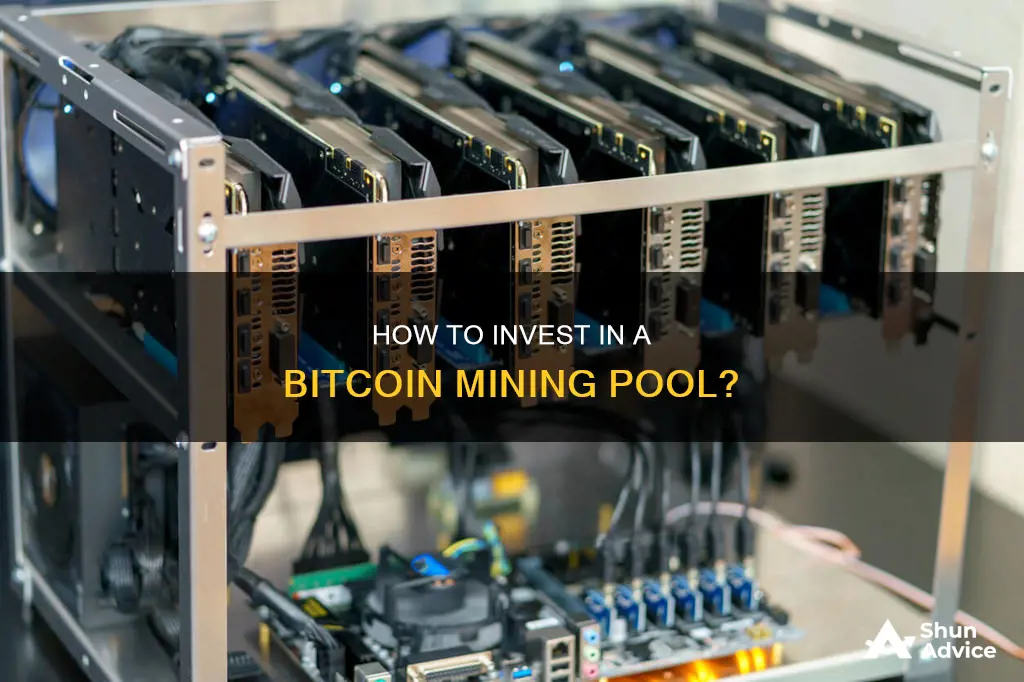
Bitcoin mining is the process of updating the ledger of Bitcoin transactions, known as the blockchain. It involves solving complex mathematical equations to guess a specific number and requires substantial hardware and software. While it is possible to mine Bitcoin individually, it is more profitable to join a mining pool, where miners combine their computing power and share rewards based on their contribution. Before investing in Bitcoin mining pools, it is essential to consider factors such as pool fees, size, power, stability, and payout schemes.
| Characteristics | Values |
|---|---|
| Purpose | To generate more consistent payouts for miners |
| Requirements | Mining software, hardware and a Bitcoin wallet |
| Rewards | Newly minted Bitcoins and transaction fees |
| Risks | Financial, legal and environmental |
| Pool Concentration by Country | The United States (34%), The Czech Republic (2%) |
What You'll Learn

Mining pools make miner rewards more predictable
In a mining pool, each miner contributes their processing power to finding a block. If the pool successfully mines a block, the reward is typically in the form of the associated cryptocurrency. This reward is then divided among the miners based on their contribution to the pool's overall hashing power.
There are different types of mining pools with varying payout schemes. Pay-Per-Share (PPS) pools, for example, offer fixed rewards for each share contributed by a miner, regardless of whether the pool successfully mines a block. This provides stable and predictable payouts, making it attractive for miners seeking consistency. Proportional (PROP) mining pools, on the other hand, distribute rewards based on the proportion of shares contributed by each miner. This method can result in higher payouts when blocks are mined quickly but can also lead to variability in earnings.
By joining a mining pool, miners can achieve more consistent and predictable earnings. The increased computational power of the pool enhances the chances of mining blocks, providing more regular rewards compared to solo mining.
While mining pools offer the advantage of more predictable rewards, it is important to consider the associated fees, the size and power of the pool, and the payout schemes to make an informed decision when choosing a mining pool.
Bitcoin's Future: Safe Long-Term Investment?
You may want to see also

Miners can switch their hashing power to a different pool at any time
The benefit of a mining pool is to generate more consistent payouts for miners. Pools are desirable to the average miner as they make miner rewards more predictable. However, it is important to note that mining pools are not free to join. All mining pools charge a fee.
To join a mining pool, you will need mining software, hardware, and a Bitcoin wallet. Mining software allows you to connect your miner to the Bitcoin network. Your mining pool will tell you what to put into the software so that you can connect to the pool. A Bitcoin wallet allows you to receive your mining rewards. Your mining pool will ask you for a wallet address.
Before joining a mining pool, it is important to review the pool's payout scheme, stability, fees, and size and power. It is also important to understand the risks of mining, which are generally financial. Additionally, in some jurisdictions, mining and using Bitcoin may not be legal.
The Dark Side of Bitcoin: Investing Risks Revealed
You may want to see also

Mining pools are desirable to the average miner
Additionally, mining pools provide an opportunity for miners to reduce their hardware and electricity costs. As mining requires significant computational power and resources, joining a mining pool can help distribute these costs among the participants. This increases the likelihood of covering associated expenses and turning a profit.
Another advantage of mining pools is the stability and trustworthiness they offer. A mining pool with many active miners suggests that the pool and its management are trusted. It also indicates a lower risk of downtime, which could impact mining abilities and profits.
However, it is important to consider the disadvantages of mining pools. By joining a pool, individuals give up some autonomy in the mining process as they are typically bound by the terms set by the pool. Additionally, any potential rewards are divided among the participants, resulting in a lower share of earnings for each individual.
When choosing a mining pool, it is essential to consider factors such as transparency, payout schemes, stability, fees, and size. It is also crucial to ensure that the pool uses a payout scheme that is preferable to the miner and is transparent about its operations.
El Salvador's Bitcoin Gamble: Millions Invested
You may want to see also

Cloud mining is usually a scam
Cloud mining is a term used to describe companies that allow you to rent their mining hardware in exchange for a fixed fee and a share of the revenue you make. It is marketed as a cheaper alternative to mining Bitcoins at home, which can be incredibly expensive. However, cloud mining comes with significant risks, and it is generally advised to stay away from it. Here's why:
Ineffective Business Model
Most cloud mining companies operate through an ineffective business model, which will either cause you to lose money or earn less than if you had simply bought and held Bitcoins. The fees and maintenance costs associated with cloud mining often outweigh the potential profits. In addition, if the price of Bitcoin falls, the revenue might not be sufficient to cover the maintenance fees, resulting in the termination of your contract without any refund.
Ponzi Schemes and Scams
Many cloud mining companies are outright scams or Ponzi schemes. These companies do not actually own any mining rigs and use the money invested by new customers to pay out older customers. Some well-known scams include Bitcoin Savings and Trust, Bitconnect, and OneCoin. Brave New Coin, a research organization, has also identified several dubious operations, including BlueskyMiner.com, Sunminer.com, X.CGmining.com, and GlobaleCrypto.com, which are similar to scams from Fancy Crypto, GBitcoins, HappyMiner, and AMGCrypto. These scam websites often have common characteristics, such as cheap-looking designs, spelling and grammar errors, and unrealistic offers.
High-Risk Investment
Bitcoin and cryptocurrency mining, in general, is a high-risk, high-reward investment. The market is highly volatile and unpredictable. While some people have made significant profits, others have lost money due to the fluctuating nature of cryptocurrency values.
In conclusion, while cloud mining may seem like an attractive option for those looking to get into Bitcoin mining, it is important to recognize the significant risks involved. The high likelihood of scams, ineffective business models, and the volatile nature of the cryptocurrency market make it a risky investment choice. If you are serious about investing in Bitcoin, it is generally recommended to buy and hold rather than engage in cloud mining.
Bitcoin Stock Investment: A Guide to Getting Started
You may want to see also

Mining pools are a way to join with other miners
Mining pools are a way for individual miners to join with other miners and pool their resources. This allows them to increase their chances of obtaining a block reward. As the Bitcoin network grew, individuals had to invest more and more into their computing power to be able to get meaningful rewards from the process. Simultaneously, the type of hardware needed to mine became increasingly complicated and, consequently, hardware costs continued to rise for Bitcoin miners.
Pooling resources allows miners to combine their individual computational resources with those of the other members. This enhances their joint processing power and helps them become more competitive, increasing their chances of receiving a reward. Mining pools split rewards based on how much work a miner contributes to the pool.
To draw an analogy, imagine a gold digger has the capacity to dig 100 square meters of land in one day. It would take them 100 days to explore one hectare of land for gold. Combining 100 gold diggers with the same capacity can complete the job in just one day. Any gold discovered can be split among all 100 diggers evenly, assuming all have put in equal effort to explore their assigned portions of land.
Similarly, one can combine nine mining devices, each generating mining power of 335 megahashes per second (MH/s), to generate a combined output of around three gigahashes. The output is faster and has an increased chance to solve the puzzle.
Mining pools are operated by third parties and coordinate groups of miners. By working together in a pool and sharing the payouts among all participants, miners have a better chance of being rewarded than they would working alone.
The Partial Bitcoin Investment Guide for Beginners
You may want to see also







